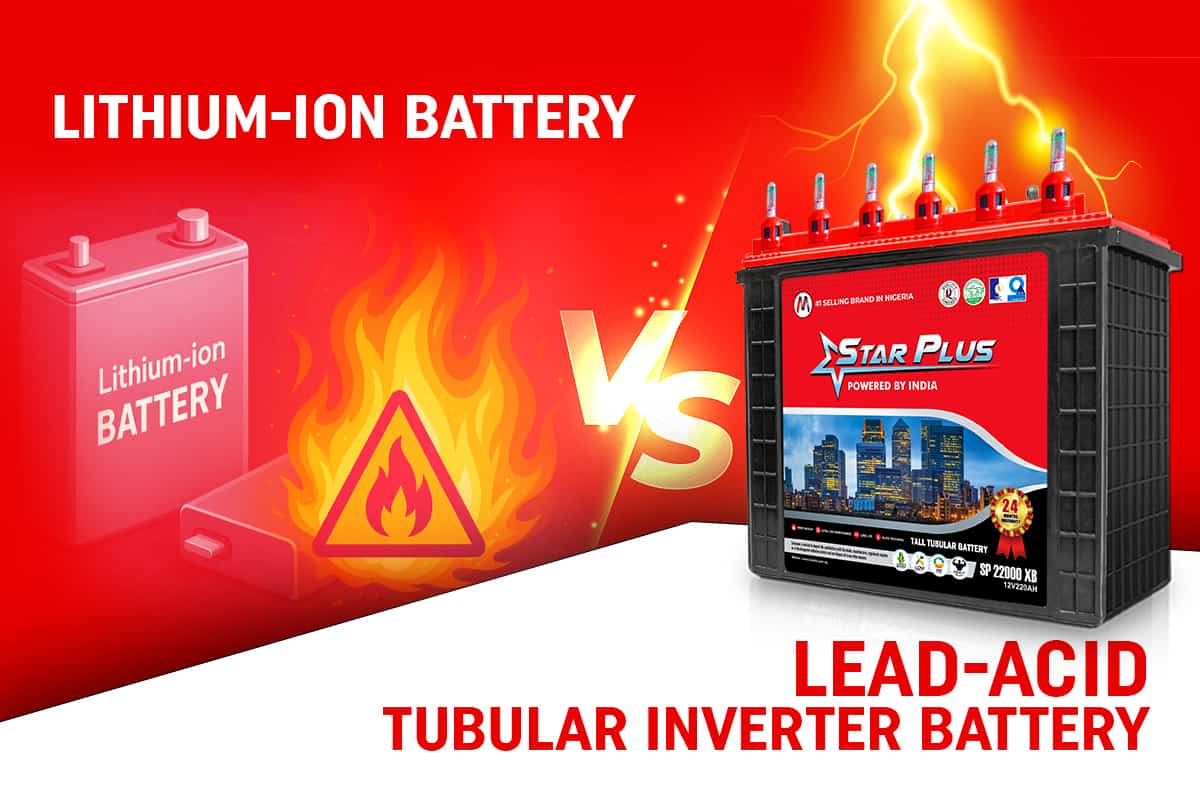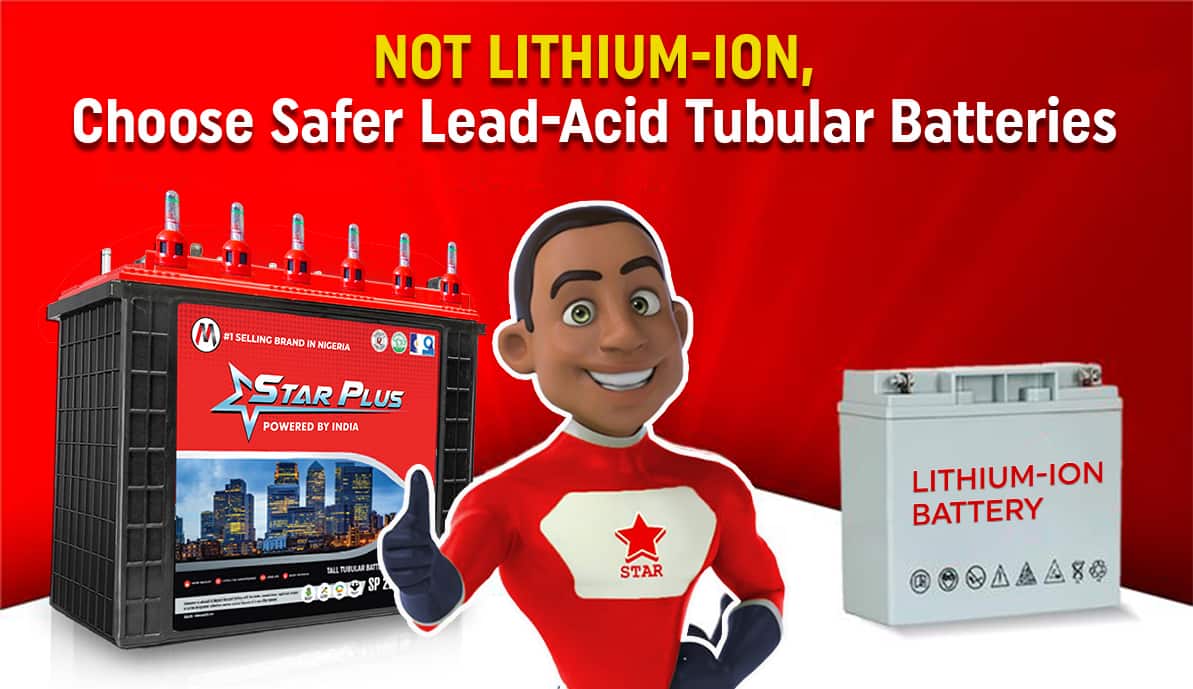Another battery problem, leading to major accidents? A recent fire in Afriland Tower, located in the Lagos Island Area of Lagos State, had reignited conversations about the hidden dangers of lithium-ion inverter battery systems.
PUNCH Metro reported on 19th September that a tragic fire broke out, claiming multiple lives and leaving several others injured. According to emergency officials, the primary cause of fatalities was smoke inhalation from a burning lithium battery inverter system, which released thick, toxic fumes that spread rapidly throughout the building.
In the last 48 hours of the incident, a total of 10 casualties were reported due to toxic smoke inhalation released from the lithium-ion battery. Beyond the immediate loss of lives and property worth millions of Naira, the tragedy raised significant concerns about the safety of inverter battery systems.
Addressing this major problem, we at Star Plus Battery have presented forward why and how lead-acid batteries are a safer option. Here’s what you need to know.
What makes a lead-acid battery safer than a lithium-ion battery?
A lead-acid battery is considered safer than a lithium-ion battery due to its lower energy density. This feature makes them less prone to catastrophic failures, such as thermal runaway, acid leak, and flammable hydrogen gas release, which are common issues with lithium-ion batteries.
Our lead-acid tubular batteries are more tolerant of extreme temperatures and repetitive cycles, and require a less complex temperature management system. This makes lead-acid batteries a safer option for use in commercial applications, due to their high temperature, load, and cycle tolerance.

Star Plus Battery Safety Features
In a discussion, Bankole Owolabi, a lecturer in the Department of Chemistry at Adekunle Ajasin University in Ondo State, confirmed the dangers of lithium-ion batteries. When a lithium battery explodes, the black smoke isn’t just soot; it carries toxic metals like magnesium, manganese, cobalt, and nickel. Once inhaled, these heavy metals enter the lungs and bloodstream, where they accumulate over time, increasing the risk of cancers and other severe health issues.
Similar occurrences in the Afriland Tower fire incident have raised concerns about the usage of lithium-ion inverter battery systems.
Addressing this factor, we have improved and included various in-built features within our lead-acid batteries to prevent explosions and the escape of toxic fumes.
1. Fume Arrestor
Our lead-acid tubular batteries are designed with a special feature of an inbuilt Fume Arrestor. This effective fume arrestor prevents any flame or spark from entering the battery, ensuring complete safety. It reduces the risk of explosions and also minimises the escaping of gases into the atmosphere.
2. Thicker Plates & Advanced Spines
Our lead-acid tubular batteries feature thicker plates and heavier materials compared to standard lithium-ion batteries. Thicker plates enable them to withstand heavy loads and function smoothly during peak hours, without any risk of explosion. Advanced Spines enables our lead-acid tubular batteries to achieve better current flow and withstand heavier loads, thereby reducing the risk of sudden failure.
3. Robust Battery Container
Our lead-acid tubular battery container is made of PP copolymer, which ensures strength & robustness. While its design minimises the risk of explosions, it offers a safer alternative to lithium-based systems.
4. Electrolyte Level Indicator
In many cases, due to low electrolyte levels, batteries heat up and explode due to excessive heat, acid spillage and gaseous buildup. Due to this issue, our lead-acid tubular batteries feature an inbuilt electrolyte level indicator that displays the electrolyte level in each cell, facilitating straightforward maintenance.
Safety Measures to Take for Your Inverter Battery
Apart from the superior design of your lead-acid tubular battery, specific safety measures are necessary to prevent explosions. Here’s how you can take some of the easy safety measures for your inverter battery:
- Place your battery in a well-ventilated place to prevent heat buildup and condensation.
- Avoid enclosed cabinets as they can lead to dangerous buildup of hydrogen gas.
- Keep any object at least six inches away from the battery to prevent air circulation around it.
- Keep the battery away from direct sunlight, heat sources and open flames.
- Do not overcharge your batteries to prevent overheating and the buildup of dangerous gases.
- Clean your battery terminals regularly to ensure proper ventilation.
- Use exhaust fans in the storage area to release accumulated heat and gases.
- Monitor water levels and, if low, top up with distilled water.
For further information on how to maintain your inverter battery for optimal safety and performance, please contact us.
Conclusion
Lithium-ion batteries are a more affordable option, but they can be risky for heavy and prolonged use. Switch to lead-acid batteries for safety.
At Star Plus Battery, we offer lead-acid tubular batteries to power Nigerian homes with safety, precision and reliability. Whether it’s a large-scale commercial setting or it’s your own home, a lead-acid tubular battery can be a convenient option.
Stay safe. Your life and power matter to us.
Please let us know in the comments below about any battery-related issues, repairs, replacements, or installations.



0 Comments